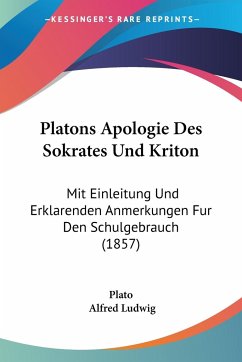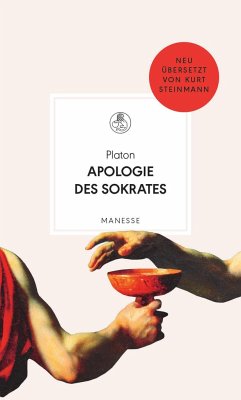
Platons Apologie Des Sokrates Und Kriton
Mit Einleitung Und Erklarenden Anmerkungen Fur Den Schulgebrauch (1857)
Herausgeber: Ludwig, Alfred
Versandkostenfrei!
Versandfertig in 1-2 Wochen
21,99 €
inkl. MwSt.

PAYBACK Punkte
11 °P sammeln!
""Platons Apologie des Sokrates und Kriton: Mit Einleitung und erkl¿¿¿¿¿renden Anmerkungen f¿¿¿¿¿r den Schulgebrauch"" ist ein Buch, das im Jahr 1857 von Plato verfasst wurde. Es handelt sich um eine ¿¿¿¿¿bersetzung der Apologie des Sokrates und des Kriton in die deutsche Sprache. Die Apologie des Sokrates ist eine Verteidigungsrede, die Sokrates vor Gericht hielt, als er wegen angeblicher Verbrechen angeklagt wurde. Der Kriton ist ein Dialog zwischen Sokrates und seinem Freund Kriton, der Sokrates dazu auffordert, aus Athen zu fliehen, um der Hinrichtung zu entgehen. Das Buch e...
""Platons Apologie des Sokrates und Kriton: Mit Einleitung und erkl¿¿¿¿¿renden Anmerkungen f¿¿¿¿¿r den Schulgebrauch"" ist ein Buch, das im Jahr 1857 von Plato verfasst wurde. Es handelt sich um eine ¿¿¿¿¿bersetzung der Apologie des Sokrates und des Kriton in die deutsche Sprache. Die Apologie des Sokrates ist eine Verteidigungsrede, die Sokrates vor Gericht hielt, als er wegen angeblicher Verbrechen angeklagt wurde. Der Kriton ist ein Dialog zwischen Sokrates und seinem Freund Kriton, der Sokrates dazu auffordert, aus Athen zu fliehen, um der Hinrichtung zu entgehen. Das Buch enth¿¿¿¿¿lt eine Einleitung, die den historischen Hintergrund der beiden Texte erkl¿¿¿¿¿rt, sowie erl¿¿¿¿¿uternde Anmerkungen, die den Text f¿¿¿¿¿r den Schulgebrauch zug¿¿¿¿¿nglicher machen. Es ist ein wichtiger Text f¿¿¿¿¿r diejenigen, die sich f¿¿¿¿¿r die Philosophie und Geschichte Griechenlands interessieren.This scarce antiquarian book is a facsimile reprint of the old original and may contain some imperfections such as library marks and notations. Because we believe this work is culturally important, we have made it available as part of our commitment for protecting, preserving, and promoting the world's literature in affordable, high quality, modern editions, that are true to their original work.












